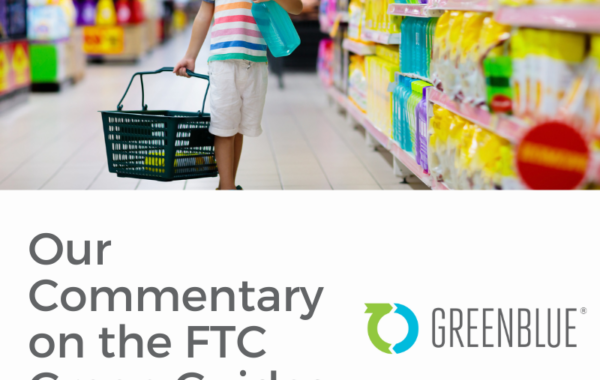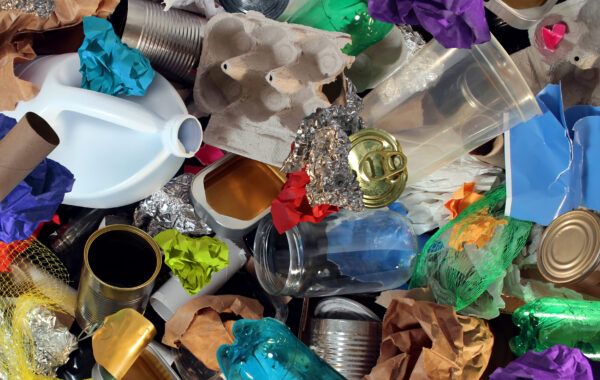May 13, 2021
*This blog is the second in a produce sticker series of three. You can read the first piece: Produce Stickers: A Small but Mighty Problem, here, and the third: Produce Stickers: The Benefits of Going Compostable, here.
This second post in our produce sticker series explores innovative alternatives.
Why did straws become the poster child for single-use plastic pollution? Perhaps it was because they are unnecessary for most consumers, nearly impossible to recycle, and commonly littered. Interestingly, many of these same characteristics apply to produce stickers, which are well-positioned to become the “next straw” in the fight against single-use plastics.
Just like straws, plastic produce stickers are frustrating to many consumers and cause waste management problems. Because they contaminate the composting process, plastic produce stickers cause real environmental damage, dooming stickered produce to continually end up in landfills. The benefits, challenges, and current state of plastic produce stickers was discussed in the first part of this series on plastic produce stickers.
With new legislation banning these items on the horizon, it is time for retailers, packers, and the produce value chain to turn to alternative solutions to plastic produce stickers. Through partnerships and investment, the produce value chain can explore some of the following innovations.
What are some alternatives to plastic produce stickers?
Laser Printing
The most promising alternative to using produce stickers is laser printing, sometimes also known as “natural branding”. This method uses laser light to mark fruit and vegetables, and can add both letters and images to a piece of fruit or vegetable by removing the pigment from the peel’s outer layer. It is a superficial process that does not affect the product’s flavor, aroma, or shelf life, and the laser-tagged part remains edible.
Laser printing has made notable advancements in Europe, with interest shown to the technology as early as 2010 through the EU’s Entrepreneurship and Innovation Programme. According to the EU-funded project, laser labeling could actually be faster than the standard method. Laser printing technology also eliminates the need to use paper, plastic, ink, adhesives, and the large-scale application of this technology may enable the reduction of GHG emissions.
A number of European retailers have been trialing these laser technologies. In 2016, Netherlands-based laser technology company Eosta and Swedish supermarket ICA ran a trial of organic fruit and vegetables with natural branding, which they claimed replaced millions of pieces of plastic packaging. In 2017, Delhaize was the first retailer in Belgium to use laser printing, and in 2021 it reported that it will be making the switch to laser printing for 12 of its organic products. In 2018, Dutch supermarket chain Jumbo debuted the process on its organic ginger, zucchini, and butternut squash. In 2019, Austrian grocer SPAR introduced laser-labeled mangoes, after having initially piloted laser-labeled avocados in 2017 but ultimately scrapping the program due to “under-developed technology.”
While the advantages of using laser printing seem great, a key downside is that it requires a wholesale switch from stickering equipment to laser printing equipment, with subsequent changes in cost and labor. Laser printing is not suitable for delicate produce, such as tomatoes. Some of the laser printing technologies may also not be suitable for produce such as oranges, mandarins, lemons and pomegranates, because the peel of those fruits can heal the laser imprint, rendering the marking invisible after some time. However, it is possible to counter this by spraying liquid on the fruit skin after the mark has been made by the laser to trigger a reaction that becomes visible.
Ink-based Printing
Printing ink on the fruit or vegetable directly eliminates the need for face stock resources and adhesives. Vegetable ink-based tattoos are considered safe and do not pose any health concerns. Capexo in France has developed a process for printing food-grade ink on the skin of almost all fruit and vegetables, adding a barcode, price or any other consumer information. It works well for fruits and vegetables with a relatively smooth skin, such as mangoes. This technology would not work as well for other types of more rough produce, such as pineapple or avocado. Another drawback is that ink labels are not entirely moisture resistant and can potentially rub off when coming in contact with water or moisture.
Compostable Produce Stickers
Compostable produce stickers are not yet widely available. However, at least two manufacturers have market-ready compostable produce stickers. In 2015, Elevate Packaging, a sustainable packaging and label technology company, entered into an exclusive distribution agreement for North America with Bio4Life, a Dutch company that produces compostable adhesive products and labels under the brand name PURE Labels. These labels are certified to the European compost standard EN13432 for industrial composting, the North American BPI certification for industrial composting, and are approved for direct food contact.
Sinclair, a large produce labeling company, has been trialing compostable stickers since 2008 and produced its first 100% certified compostable sticker, called EcoLabel, in 2019. All the components, including the face stock, adhesive, and ink passed testing to show compliance with EN 13432 and are certified by TÜV Austria under the OK Compost – Industrial and Seedling certification.
A handful of retailers and growers have explored using compostable stickers, primarily in New Zealand, Ireland, and the Netherlands. In 2019, produce importer Fyffes launched a banana band made from paper that was fully compostable and sourced from certified Forestry Stewardship Council approved sources. It was successfully trialed in real-life market conditions in retail outlets in Ireland.
In 2019, Bostock New Zealand, an organic apple grower, said it planned to roll out more industrially-compostable stickers in 2020 after a successful trial. It claimed to be the first apple grower in the Southern Hemisphere to do so. New Zealand kiwi marketer Zespri also reported that it had been trialing the Sinclair EcoLabel prototype since 2010, but planned to use the labels commercially in 2020 on all of its organic kiwi fruit.
In 2020, PLUS, a Netherlands-based co-op of nearly 270 stores, reported that it was now offering Fairtrade bananas wrapped with a compostable band and Dutch apples and pears with “biodegradable” stickers. The Dutch fruit cooperative Fruitmasters also offers a brand of apples that use compostable produce stickers. These apples were showcased to the Dutch royal couple in 2019 as part of innovations in “fully plastic-free fruit packaging”.
Though not yet mainstream, innovations and alternatives to plastic produce stickers are being developed by pioneering manufacturers, produce brands, and retailers. In our final post, we’ll explore the benefits of compostable alternatives to produce stickers and the barriers that need to be overcome in order for solutions to scale.





